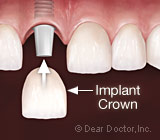 Dental implants are a fascinating treatment option that can be life changing when used properly. They have also experienced tremendous scientific advancements and press over the years making them highly desirable by people of all walks of life. See how much you really know about dental implants by taking our quick and easy true/false self test.
Dental implants are a fascinating treatment option that can be life changing when used properly. They have also experienced tremendous scientific advancements and press over the years making them highly desirable by people of all walks of life. See how much you really know about dental implants by taking our quick and easy true/false self test.
- Dental implants can produce lifelike results that are indistinguishable from natural surrounding teeth.
True or False - Many dental professionals consider dental implants as a “third set of teeth,” as they can last a lifetime when properly maintained.
True or False - A dental implant is a safe option that is suitable for all patients regardless of age.
True or False - When properly placed and maintained, dental implants have a 90% success rate.
True or False - If you do not have enough bone to support a successful dental implant, there is not much that can be done.
True or False - When teeth are missing, the face tends to have a sunken-in appearance called, “posterior bite collapse.”
True or False - One of the positives of dental implants is that they do not affect adjacent teeth.
True or False - Dental implants typically cost significantly more than other options, such as a bridge, over the course of a lifetime.
True or False - Dental implants are always more desirable than bridgework or other treatment options for missing teeth.
True or False - Dental implants can lead to improved health due to better nutrition and proper digestion.
True or False
Answers:
- True. Dental implants can appear as beautiful, natural teeth.
- True. When properly maintained, implants provide the same function as natural teeth roots.
- False. Dental implants are not suitable for replacing primary teeth or permanent teeth in young children or teenagers. They are best used when facial and jaw development is complete.
- False. They have a 95% success rate.
- False. If you do not have enough bone for a dental implant, you may be a candidate for a bone graft — a process in which we “grow” the bone we need for the implant.
- True. This condition is often totally reversible once teeth have been restored through implants or bridgework.
- True. Unlike bridgework, dental implants do not affect surrounding teeth.
- False. They are less expensive in the long run.
- False. Sometimes a bridge is better than an implant.
- True. Once teeth are restored, chewing and digesting food is easier; thus health improves.
To learn more, continue reading the Dear Doctor magazine article “Dental Implants, Your Third Set of Teeth.” Or, you can contact us today to schedule an appointment or to discuss your questions.



